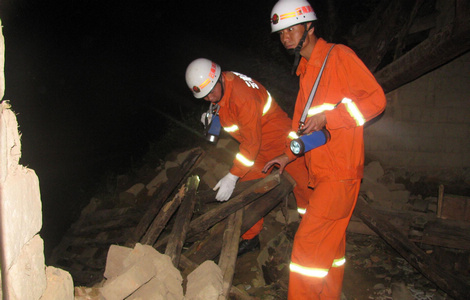Canadian natives to increase engagement with China
Updated: 2011-08-10 14:42
(Xinhua)
|
|||||||||||
VANCOUVER - British Columbia's native people announced Tuesday they are seeking to play a greater role in the Canadian province's engagement with China through a new strategy aimed at stronger cultural and economic ties.
At a press conference in Vancouver hosted by the Asia Pacific Foundation of Canada, a think-tank that helped develop the strategy, aboriginal leaders unveiled their First Nations-China: Transforming Relationship plan. The seven-point strategy focused on creating greater "economic, cultural and educational opportunities for First Nations youth, elders and businesses."
The strategies include the expansion of market opportunities for First Nations in China, creating a branding strategy to promote First Nations opportunities in China, and building the internal capacity of First Nations awareness and understanding of China.
The think-tank intends to create a joint First Nations, provincial and federal technical working group to promote reciprocal annual missions between First Nations, Canada and China.
It plans to develop the best practices to help Chinese investors understand the consultation and collaboration process with First Nations, including the establishment of a "China Desk" to assist First Nations in responding to and developing business opportunities.
"Right now, I think they (B.C. and Canada) are doing it in isolation of First Nations and by meaningful involvement, I mean being involved in all the trade missions, being involved in the strategic investment decisions, being a part of the some of the opportunities," said Dave Porter of the B.C. First Nations Leadership Council
Grand Chief Stewart Phillip of the Union of British Columbian Indian Chiefs said First Nations are currently "experiencing unprecedented inquiries" from Chinese companies wanting to develop projects in their territories, while Porter pointed to 11 million cubic meters of wood "sitting in the bush in First Nations' hands" that needed to be processed, as examples of unrealized business opportunities.
In May, a changing of the guard occurred when China surpassed the United States for the first time as the top destination for B.C. softwood lumber when 746,000 cubic meters of lumber were exported.
But in a province rich with natural resources, primarily in forestry and mining, land use is considered a provincial jurisdiction. To date, the western province has only signed a handful of land treaties with native bands, a group that accounts for nearly 200,000 people, about five percent of the B.C. population, according to the 2006 Canadian census.
Despite questions on land ownership, precedents have been set in the courts which have ruled local First Nations must be consulted over resource extraction.
Following the Canadian aboriginal leaders' visit to China last summer, their visit in October would include both cultural initiatives and meetings with the investment community.
Porter said the group was keen in developing relationships with companies operating in oil, gas and tourism, among others. He said that help would be needed in establishing a First Nations China desk, ideally both in Vancouver and China in order to foster business development opportunities.
"We don't have the resources to pay for that. So we're talking to the province and the federal government," he said. "But the B.C. First Nations wants to work in partnership with Canada and British Columbia to be connected to the inroads that they've made in China."
Among those looking on at the meeting was Stockwell Day. Earlier this year he left political life after serving as Canada's treasury minister and minister for the Asia-Pacific Gateway. From his many trips to China, he was very interested in this strategy from the investment community.
"We know there are 85 million homes that are going to be needed and built the next five years in China. That's a lot of wood, a lot of copper, a lot of fiber optics. There's opportunity in a positive way and this step today is a good move in that direction."
Related Stories
China pledges broad cooperation with Canada 2011-07-18 22:01
Chinese professionals strive for career success in Canada 2011-06-06 10:22
China's investment in Canada surges 2011-04-16 16:26
China's direct investment in Canada increases 2011-04-16 15:05
Hot Topics
Anti-Gay, Giant Panda, Subway, High Speed Train, Coal Mine, High Temperature, Rainstorm, Sino-US, Oil Spill, Zhu Min
Editor's Picks

|

|

|

|

|

|







